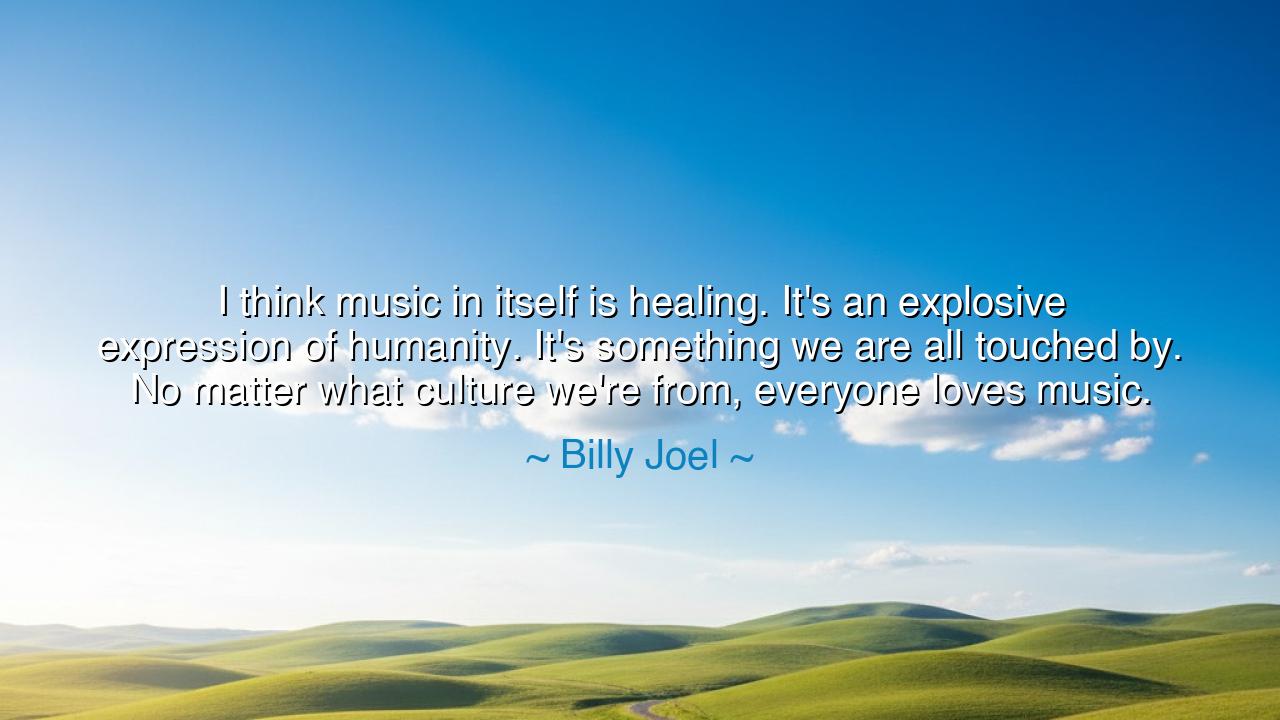
I think music in itself is healing. It's an explosive expression
I think music in itself is healing. It's an explosive expression of humanity. It's something we are all touched by. No matter what culture we're from, everyone loves music.






Billy Joel, singer of truth and chronicler of the human heart, once declared: “I think music in itself is healing. It’s an explosive expression of humanity. It’s something we are all touched by. No matter what culture we’re from, everyone loves music.” These words are not mere sentiment, but a testimony to the eternal bond between song and the soul. For music is no invention of man, like ships or machines, but a gift woven into the very fabric of our being, a universal tongue that every heart understands.
To call music healing is to speak of its mysterious power to mend what cannot be mended by hand. Wounds of the flesh are treated with medicine, but wounds of the spirit require another remedy. A melody can lift despair, a hymn can soothe grief, a song can rekindle hope where all seemed lost. This is why the ancients sang at births and at burials, in triumph and in sorrow—because they knew that music touches the soul where words cannot reach, restoring balance to the broken heart.
Billy Joel also calls it an explosive expression of humanity, and rightly so. For music is not quiet or tame; it bursts forth from the depths of the human spirit, revealing our passions, our struggles, our joys, our fears. In a single song, anger may roar, love may sigh, and longing may echo like thunder in a canyon. This is the “explosion” Joel speaks of—not destruction, but revelation. Music is humanity made audible, our invisible essence given voice.
History bears witness to this truth. When Nelson Mandela was imprisoned in South Africa, freedom songs were sung in the streets by those who longed for justice. These songs gave courage to the weary, bound people together in unity, and proclaimed hope to the world. Guns could silence bodies, but they could not silence the music that healed the wounds of oppression. And when freedom came, it was the very same music that celebrated victory, binding a divided nation into one chorus.
Joel reminds us also that music is universal—it belongs to no one people, no single tongue. The drums of Africa, the sitar of India, the flute of the Andes, the chant of monks in stone monasteries—all are threads in the great tapestry of sound. Though cultures differ, every people sings, every people drums, every people dances. This is because music springs not from culture but from humanity itself. It is the heartbeat of the race, reminding us that beneath our differences we share the same essence.
The meaning of this teaching is both humbling and exalted. It tells us that music is not a luxury but a necessity, for it expresses what words cannot and heals what reason cannot. It calls us to recognize that when we sing together, we are closer than nations or languages—we are one humanity. In song, walls fall, divisions blur, and the soul remembers its kinship with all living things.
For us who hear these words, the lesson is clear. Let music be a healer in your own life. When sorrow comes, let a song carry you through. When division rises, let shared music remind you of unity. Practical steps follow: sing without shame, listen deeply to the songs of other cultures, share melodies with others, and remember that in music, you are both revealed and restored.
Thus Billy Joel’s words shine as an eternal flame: “Music in itself is healing. It is an explosive expression of humanity… everyone loves music.” Cherish it, honor it, and let it guide you. For in song lies the power to heal the broken, unite the divided, and remind every soul that to be human is to be part of a symphony greater than ourselves.






AAdministratorAdministrator
Welcome, honored guests. Please leave a comment, we will respond soon